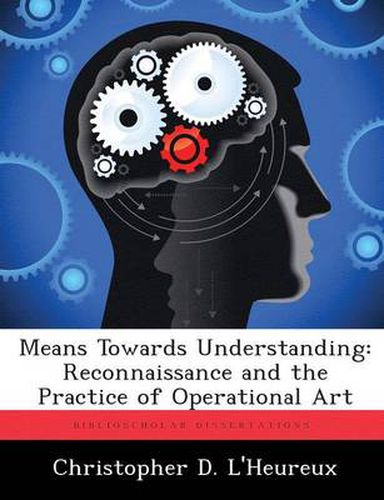Readings Newsletter
Become a Readings Member to make your shopping experience even easier.
Sign in or sign up for free!
You’re not far away from qualifying for FREE standard shipping within Australia
You’ve qualified for FREE standard shipping within Australia
The cart is loading…






This title is printed to order. This book may have been self-published. If so, we cannot guarantee the quality of the content. In the main most books will have gone through the editing process however some may not. We therefore suggest that you be aware of this before ordering this book. If in doubt check either the author or publisher’s details as we are unable to accept any returns unless they are faulty. Please contact us if you have any questions.
This monograph examines the relationship between reconnaissance and the application of operational art. The operational artist requires reconnaissance to arrange tactical actions in time, space, and purpose to achieve an overarching strategic objective effectively. The artist uses reconnaissance as a means to gain relevant information and mitigate uncertainty by identifying potential risks and opportunities yet unknown, clarifying ambiguous situations, and providing the time and space to react to unforeseen circumstances. A lack of reconnaissance minimizes the amount of available relevant information and invites surprise increasing the probability that any given tactical action will not achieve the intended object. The paper reviews the academic literature and doctrine regarding reconnaissance from 1860 through the present and evaluates the Vicksburg and Normandy campaigns to determine how reconnaissance shaped the arrangement of tactical actions in time, space, and purpose. It concludes that the operational artist requires reconnaissance to practice operational art effectively. Relevant information gathered by reconnaissance facilitates understanding and thus enhances planning and informs decision-making. The failure to utilize reconnaissance, however, leaves commanders and staffs without the relevant information necessary to make informed decisions and invites surprise.
$9.00 standard shipping within Australia
FREE standard shipping within Australia for orders over $100.00
Express & International shipping calculated at checkout
This title is printed to order. This book may have been self-published. If so, we cannot guarantee the quality of the content. In the main most books will have gone through the editing process however some may not. We therefore suggest that you be aware of this before ordering this book. If in doubt check either the author or publisher’s details as we are unable to accept any returns unless they are faulty. Please contact us if you have any questions.
This monograph examines the relationship between reconnaissance and the application of operational art. The operational artist requires reconnaissance to arrange tactical actions in time, space, and purpose to achieve an overarching strategic objective effectively. The artist uses reconnaissance as a means to gain relevant information and mitigate uncertainty by identifying potential risks and opportunities yet unknown, clarifying ambiguous situations, and providing the time and space to react to unforeseen circumstances. A lack of reconnaissance minimizes the amount of available relevant information and invites surprise increasing the probability that any given tactical action will not achieve the intended object. The paper reviews the academic literature and doctrine regarding reconnaissance from 1860 through the present and evaluates the Vicksburg and Normandy campaigns to determine how reconnaissance shaped the arrangement of tactical actions in time, space, and purpose. It concludes that the operational artist requires reconnaissance to practice operational art effectively. Relevant information gathered by reconnaissance facilitates understanding and thus enhances planning and informs decision-making. The failure to utilize reconnaissance, however, leaves commanders and staffs without the relevant information necessary to make informed decisions and invites surprise.